Organisational Behaviour Report: 4Com Plc Analysis and Theories
VerifiedAdded on 2020/11/23
|15
|4743
|439
Report
AI Summary
This report provides a comprehensive analysis of organizational behaviour, using 4Com Plc as a case study. It explores key concepts such as organizational culture (including Handy's typology), power dynamics (types of power like coercive and reward), and organizational politics. The report then delves into motivation theories, differentiating between content theories (Maslow's hierarchy of needs) and process theories (Vroom's expectancy theory). Furthermore, the report evaluates team effectiveness, and concludes by exploring concepts and philosophies of organizational behaviour, including Path Goal Theory. The report aims to provide a practical understanding of how these elements influence employee behaviour and organizational performance, offering insights into effective management strategies within the context of 4Com Plc.
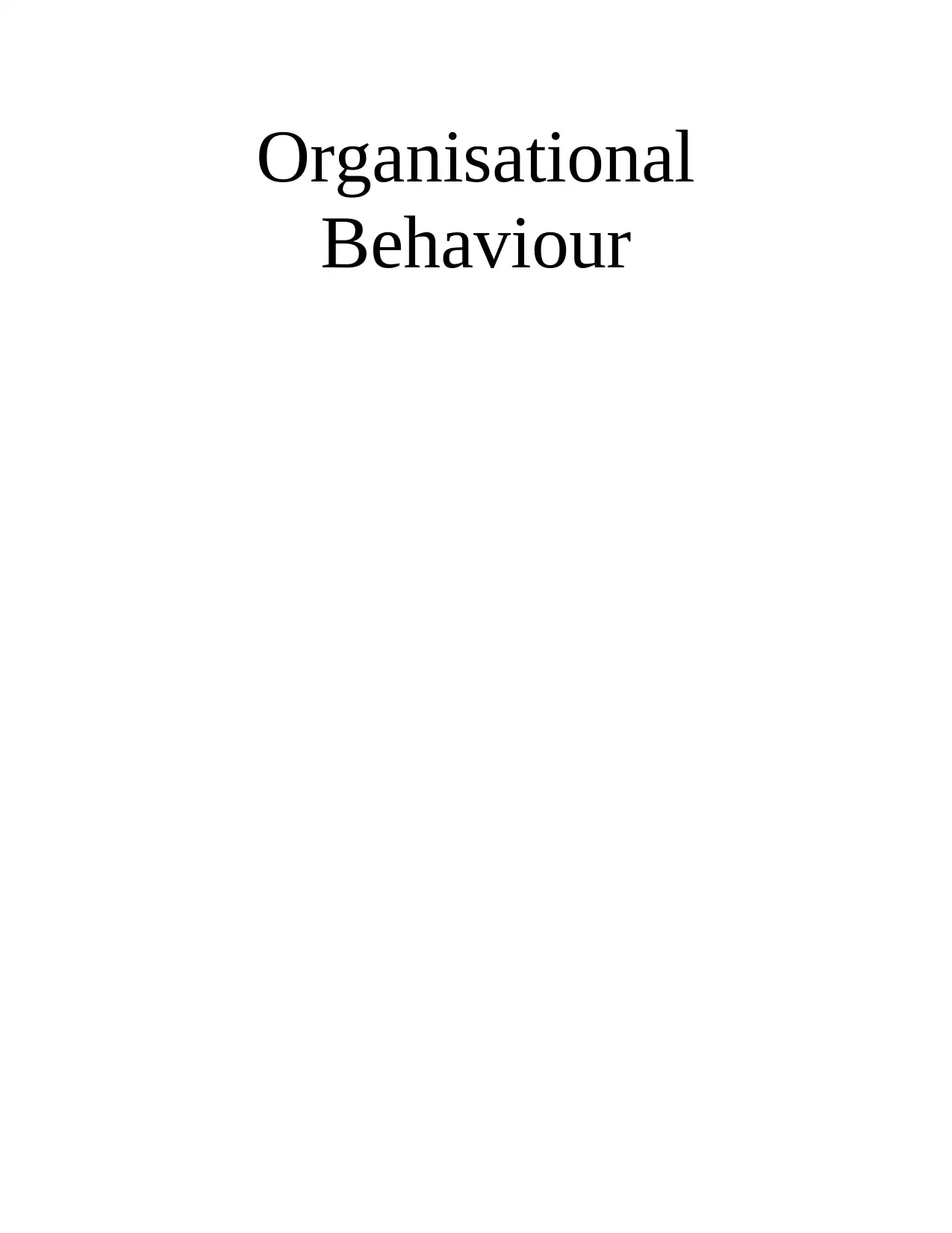
Organisational
Behaviour
Behaviour
Paraphrase This Document
Need a fresh take? Get an instant paraphrase of this document with our AI Paraphraser
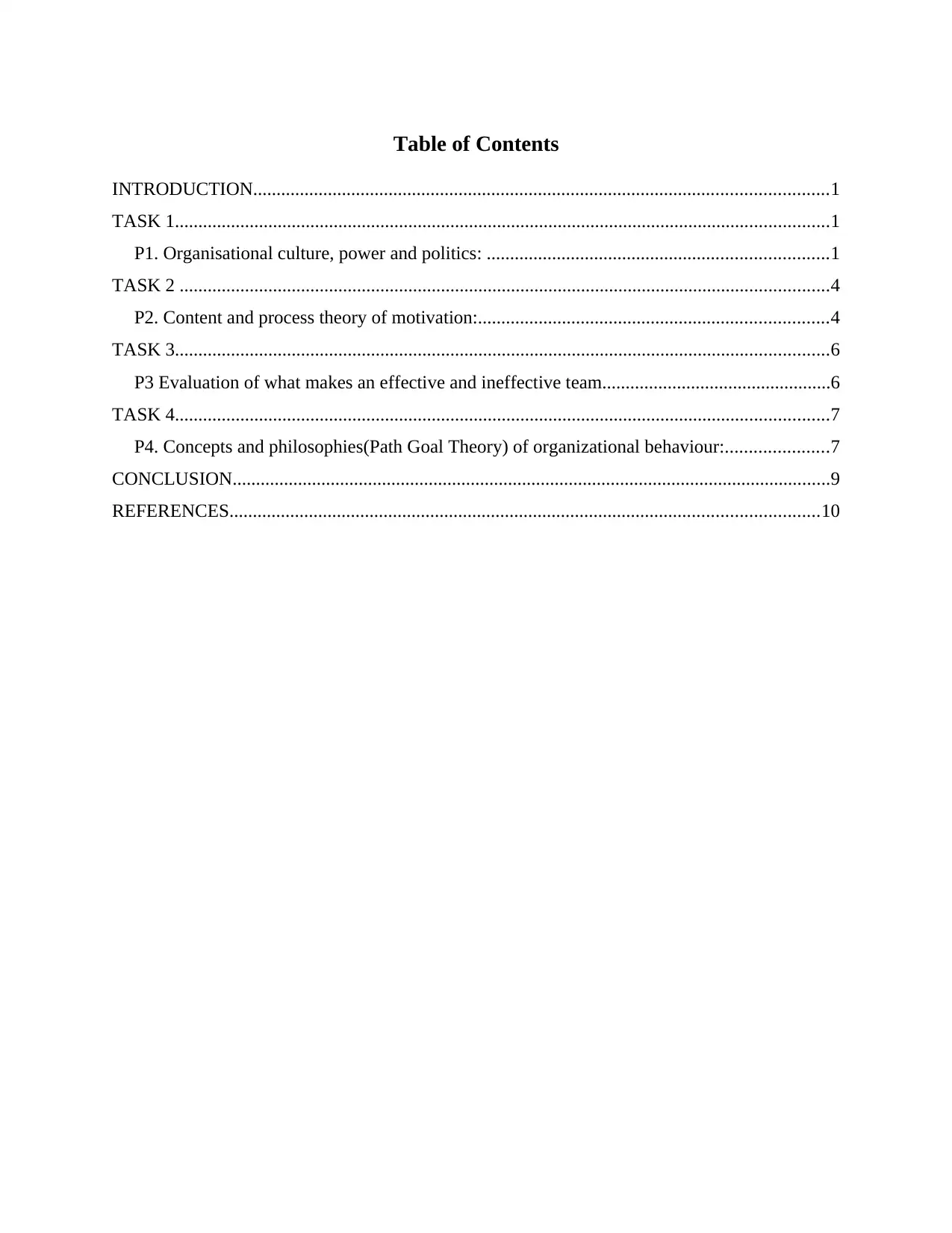
Table of Contents
INTRODUCTION...........................................................................................................................1
TASK 1............................................................................................................................................1
P1. Organisational culture, power and politics: .........................................................................1
TASK 2 ...........................................................................................................................................4
P2. Content and process theory of motivation:...........................................................................4
TASK 3............................................................................................................................................6
P3 Evaluation of what makes an effective and ineffective team.................................................6
TASK 4............................................................................................................................................7
P4. Concepts and philosophies(Path Goal Theory) of organizational behaviour:......................7
CONCLUSION................................................................................................................................9
REFERENCES..............................................................................................................................10
INTRODUCTION...........................................................................................................................1
TASK 1............................................................................................................................................1
P1. Organisational culture, power and politics: .........................................................................1
TASK 2 ...........................................................................................................................................4
P2. Content and process theory of motivation:...........................................................................4
TASK 3............................................................................................................................................6
P3 Evaluation of what makes an effective and ineffective team.................................................6
TASK 4............................................................................................................................................7
P4. Concepts and philosophies(Path Goal Theory) of organizational behaviour:......................7
CONCLUSION................................................................................................................................9
REFERENCES..............................................................................................................................10

⊘ This is a preview!⊘
Do you want full access?
Subscribe today to unlock all pages.

Trusted by 1+ million students worldwide
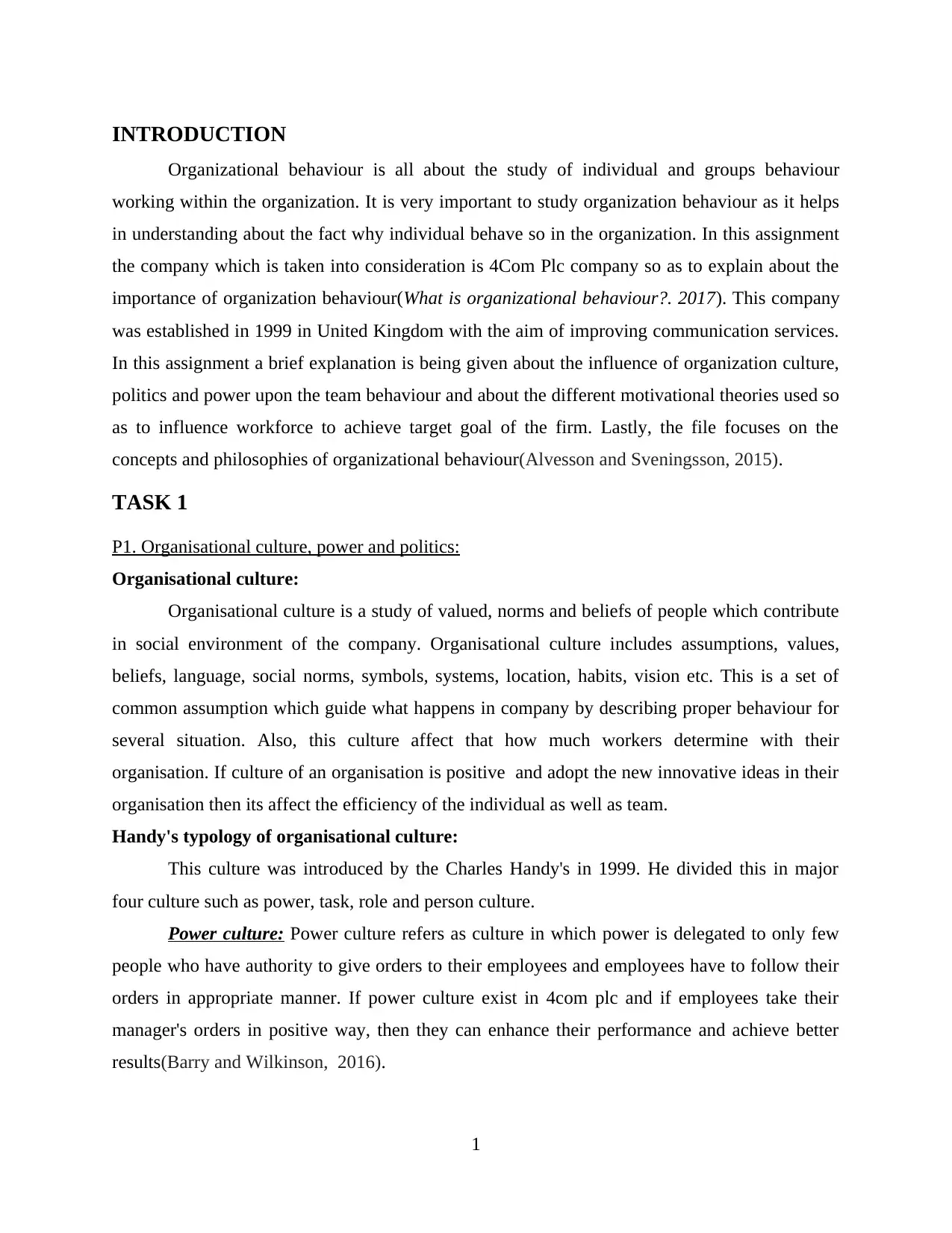
INTRODUCTION
Organizational behaviour is all about the study of individual and groups behaviour
working within the organization. It is very important to study organization behaviour as it helps
in understanding about the fact why individual behave so in the organization. In this assignment
the company which is taken into consideration is 4Com Plc company so as to explain about the
importance of organization behaviour(What is organizational behaviour?. 2017). This company
was established in 1999 in United Kingdom with the aim of improving communication services.
In this assignment a brief explanation is being given about the influence of organization culture,
politics and power upon the team behaviour and about the different motivational theories used so
as to influence workforce to achieve target goal of the firm. Lastly, the file focuses on the
concepts and philosophies of organizational behaviour(Alvesson and Sveningsson, 2015).
TASK 1
P1. Organisational culture, power and politics:
Organisational culture:
Organisational culture is a study of valued, norms and beliefs of people which contribute
in social environment of the company. Organisational culture includes assumptions, values,
beliefs, language, social norms, symbols, systems, location, habits, vision etc. This is a set of
common assumption which guide what happens in company by describing proper behaviour for
several situation. Also, this culture affect that how much workers determine with their
organisation. If culture of an organisation is positive and adopt the new innovative ideas in their
organisation then its affect the efficiency of the individual as well as team.
Handy's typology of organisational culture:
This culture was introduced by the Charles Handy's in 1999. He divided this in major
four culture such as power, task, role and person culture.
Power culture: Power culture refers as culture in which power is delegated to only few
people who have authority to give orders to their employees and employees have to follow their
orders in appropriate manner. If power culture exist in 4com plc and if employees take their
manager's orders in positive way, then they can enhance their performance and achieve better
results(Barry and Wilkinson, 2016).
1
Organizational behaviour is all about the study of individual and groups behaviour
working within the organization. It is very important to study organization behaviour as it helps
in understanding about the fact why individual behave so in the organization. In this assignment
the company which is taken into consideration is 4Com Plc company so as to explain about the
importance of organization behaviour(What is organizational behaviour?. 2017). This company
was established in 1999 in United Kingdom with the aim of improving communication services.
In this assignment a brief explanation is being given about the influence of organization culture,
politics and power upon the team behaviour and about the different motivational theories used so
as to influence workforce to achieve target goal of the firm. Lastly, the file focuses on the
concepts and philosophies of organizational behaviour(Alvesson and Sveningsson, 2015).
TASK 1
P1. Organisational culture, power and politics:
Organisational culture:
Organisational culture is a study of valued, norms and beliefs of people which contribute
in social environment of the company. Organisational culture includes assumptions, values,
beliefs, language, social norms, symbols, systems, location, habits, vision etc. This is a set of
common assumption which guide what happens in company by describing proper behaviour for
several situation. Also, this culture affect that how much workers determine with their
organisation. If culture of an organisation is positive and adopt the new innovative ideas in their
organisation then its affect the efficiency of the individual as well as team.
Handy's typology of organisational culture:
This culture was introduced by the Charles Handy's in 1999. He divided this in major
four culture such as power, task, role and person culture.
Power culture: Power culture refers as culture in which power is delegated to only few
people who have authority to give orders to their employees and employees have to follow their
orders in appropriate manner. If power culture exist in 4com plc and if employees take their
manager's orders in positive way, then they can enhance their performance and achieve better
results(Barry and Wilkinson, 2016).
1
Paraphrase This Document
Need a fresh take? Get an instant paraphrase of this document with our AI Paraphraser
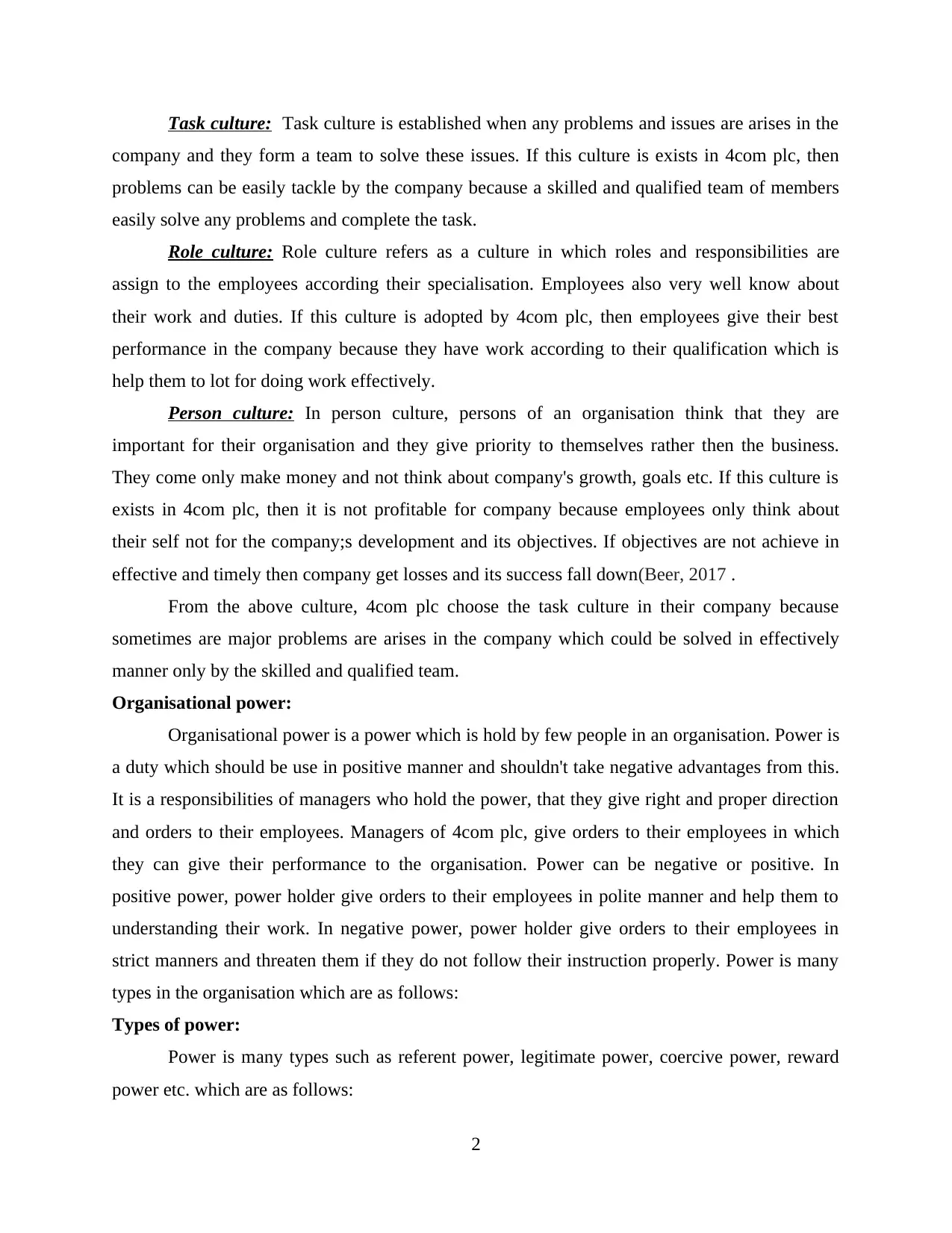
Task culture: Task culture is established when any problems and issues are arises in the
company and they form a team to solve these issues. If this culture is exists in 4com plc, then
problems can be easily tackle by the company because a skilled and qualified team of members
easily solve any problems and complete the task.
Role culture: Role culture refers as a culture in which roles and responsibilities are
assign to the employees according their specialisation. Employees also very well know about
their work and duties. If this culture is adopted by 4com plc, then employees give their best
performance in the company because they have work according to their qualification which is
help them to lot for doing work effectively.
Person culture: In person culture, persons of an organisation think that they are
important for their organisation and they give priority to themselves rather then the business.
They come only make money and not think about company's growth, goals etc. If this culture is
exists in 4com plc, then it is not profitable for company because employees only think about
their self not for the company;s development and its objectives. If objectives are not achieve in
effective and timely then company get losses and its success fall down(Beer, 2017 .
From the above culture, 4com plc choose the task culture in their company because
sometimes are major problems are arises in the company which could be solved in effectively
manner only by the skilled and qualified team.
Organisational power:
Organisational power is a power which is hold by few people in an organisation. Power is
a duty which should be use in positive manner and shouldn't take negative advantages from this.
It is a responsibilities of managers who hold the power, that they give right and proper direction
and orders to their employees. Managers of 4com plc, give orders to their employees in which
they can give their performance to the organisation. Power can be negative or positive. In
positive power, power holder give orders to their employees in polite manner and help them to
understanding their work. In negative power, power holder give orders to their employees in
strict manners and threaten them if they do not follow their instruction properly. Power is many
types in the organisation which are as follows:
Types of power:
Power is many types such as referent power, legitimate power, coercive power, reward
power etc. which are as follows:
2
company and they form a team to solve these issues. If this culture is exists in 4com plc, then
problems can be easily tackle by the company because a skilled and qualified team of members
easily solve any problems and complete the task.
Role culture: Role culture refers as a culture in which roles and responsibilities are
assign to the employees according their specialisation. Employees also very well know about
their work and duties. If this culture is adopted by 4com plc, then employees give their best
performance in the company because they have work according to their qualification which is
help them to lot for doing work effectively.
Person culture: In person culture, persons of an organisation think that they are
important for their organisation and they give priority to themselves rather then the business.
They come only make money and not think about company's growth, goals etc. If this culture is
exists in 4com plc, then it is not profitable for company because employees only think about
their self not for the company;s development and its objectives. If objectives are not achieve in
effective and timely then company get losses and its success fall down(Beer, 2017 .
From the above culture, 4com plc choose the task culture in their company because
sometimes are major problems are arises in the company which could be solved in effectively
manner only by the skilled and qualified team.
Organisational power:
Organisational power is a power which is hold by few people in an organisation. Power is
a duty which should be use in positive manner and shouldn't take negative advantages from this.
It is a responsibilities of managers who hold the power, that they give right and proper direction
and orders to their employees. Managers of 4com plc, give orders to their employees in which
they can give their performance to the organisation. Power can be negative or positive. In
positive power, power holder give orders to their employees in polite manner and help them to
understanding their work. In negative power, power holder give orders to their employees in
strict manners and threaten them if they do not follow their instruction properly. Power is many
types in the organisation which are as follows:
Types of power:
Power is many types such as referent power, legitimate power, coercive power, reward
power etc. which are as follows:
2
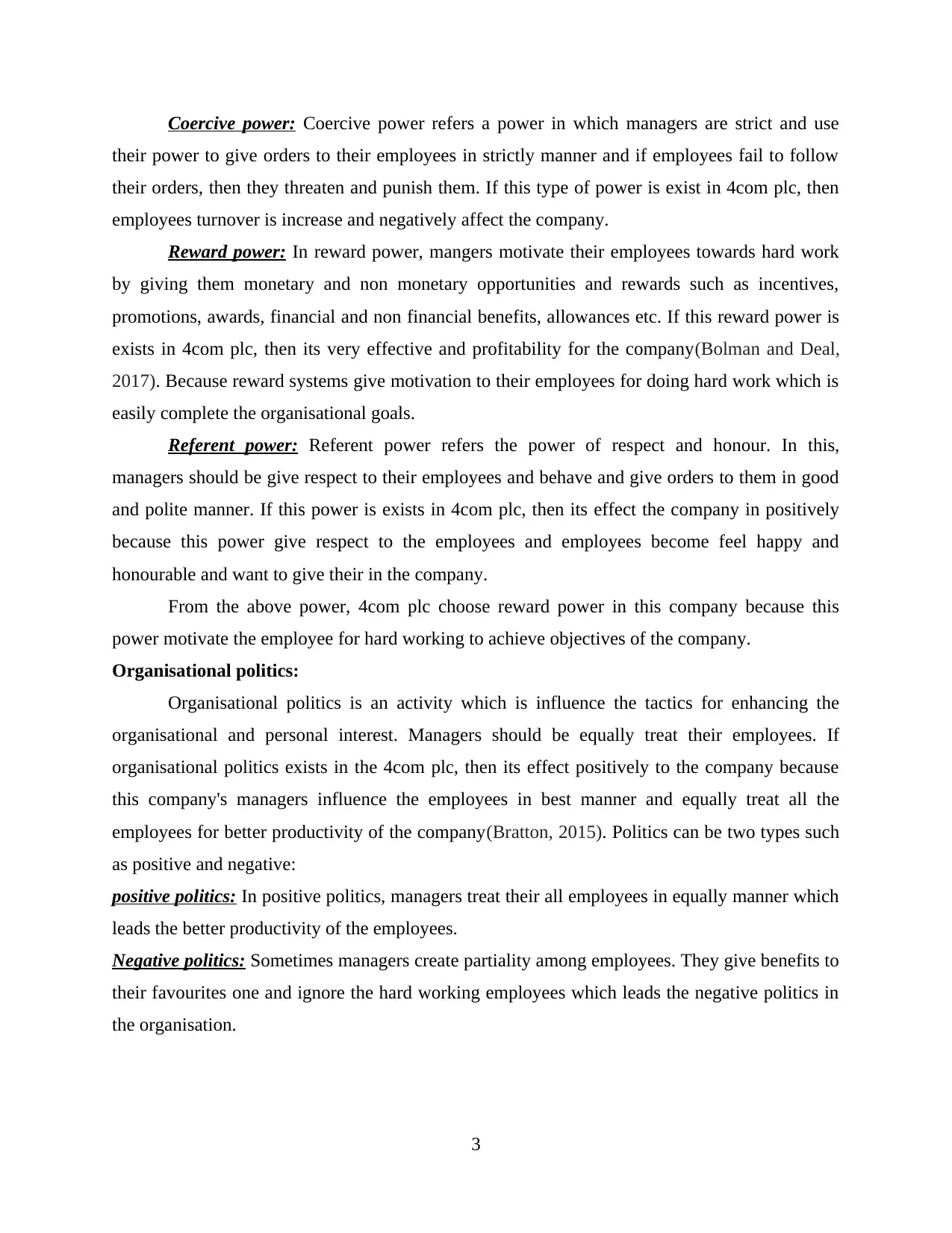
Coercive power: Coercive power refers a power in which managers are strict and use
their power to give orders to their employees in strictly manner and if employees fail to follow
their orders, then they threaten and punish them. If this type of power is exist in 4com plc, then
employees turnover is increase and negatively affect the company.
Reward power: In reward power, mangers motivate their employees towards hard work
by giving them monetary and non monetary opportunities and rewards such as incentives,
promotions, awards, financial and non financial benefits, allowances etc. If this reward power is
exists in 4com plc, then its very effective and profitability for the company(Bolman and Deal,
2017). Because reward systems give motivation to their employees for doing hard work which is
easily complete the organisational goals.
Referent power: Referent power refers the power of respect and honour. In this,
managers should be give respect to their employees and behave and give orders to them in good
and polite manner. If this power is exists in 4com plc, then its effect the company in positively
because this power give respect to the employees and employees become feel happy and
honourable and want to give their in the company.
From the above power, 4com plc choose reward power in this company because this
power motivate the employee for hard working to achieve objectives of the company.
Organisational politics:
Organisational politics is an activity which is influence the tactics for enhancing the
organisational and personal interest. Managers should be equally treat their employees. If
organisational politics exists in the 4com plc, then its effect positively to the company because
this company's managers influence the employees in best manner and equally treat all the
employees for better productivity of the company(Bratton, 2015). Politics can be two types such
as positive and negative:
positive politics: In positive politics, managers treat their all employees in equally manner which
leads the better productivity of the employees.
Negative politics: Sometimes managers create partiality among employees. They give benefits to
their favourites one and ignore the hard working employees which leads the negative politics in
the organisation.
3
their power to give orders to their employees in strictly manner and if employees fail to follow
their orders, then they threaten and punish them. If this type of power is exist in 4com plc, then
employees turnover is increase and negatively affect the company.
Reward power: In reward power, mangers motivate their employees towards hard work
by giving them monetary and non monetary opportunities and rewards such as incentives,
promotions, awards, financial and non financial benefits, allowances etc. If this reward power is
exists in 4com plc, then its very effective and profitability for the company(Bolman and Deal,
2017). Because reward systems give motivation to their employees for doing hard work which is
easily complete the organisational goals.
Referent power: Referent power refers the power of respect and honour. In this,
managers should be give respect to their employees and behave and give orders to them in good
and polite manner. If this power is exists in 4com plc, then its effect the company in positively
because this power give respect to the employees and employees become feel happy and
honourable and want to give their in the company.
From the above power, 4com plc choose reward power in this company because this
power motivate the employee for hard working to achieve objectives of the company.
Organisational politics:
Organisational politics is an activity which is influence the tactics for enhancing the
organisational and personal interest. Managers should be equally treat their employees. If
organisational politics exists in the 4com plc, then its effect positively to the company because
this company's managers influence the employees in best manner and equally treat all the
employees for better productivity of the company(Bratton, 2015). Politics can be two types such
as positive and negative:
positive politics: In positive politics, managers treat their all employees in equally manner which
leads the better productivity of the employees.
Negative politics: Sometimes managers create partiality among employees. They give benefits to
their favourites one and ignore the hard working employees which leads the negative politics in
the organisation.
3
⊘ This is a preview!⊘
Do you want full access?
Subscribe today to unlock all pages.

Trusted by 1+ million students worldwide
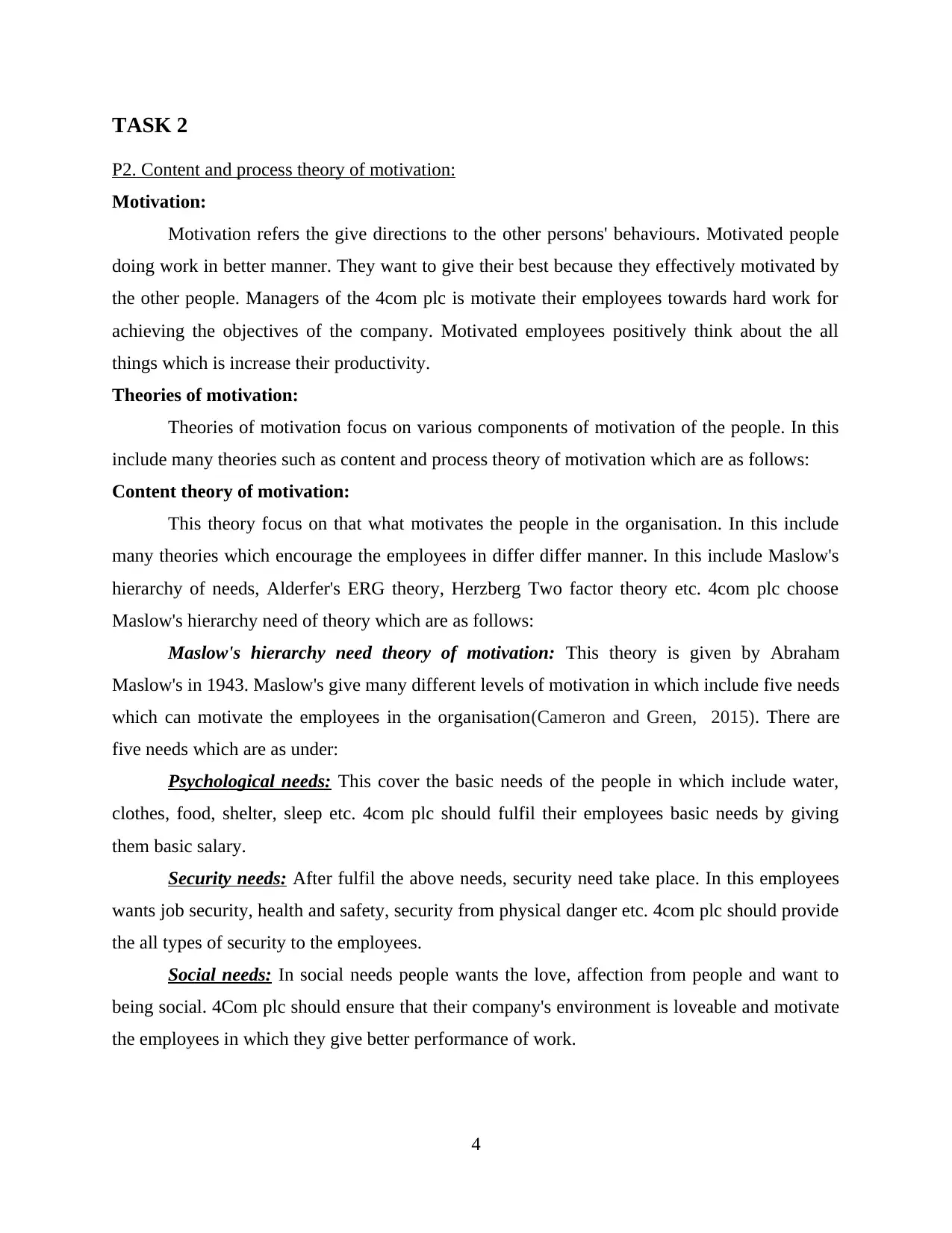
TASK 2
P2. Content and process theory of motivation:
Motivation:
Motivation refers the give directions to the other persons' behaviours. Motivated people
doing work in better manner. They want to give their best because they effectively motivated by
the other people. Managers of the 4com plc is motivate their employees towards hard work for
achieving the objectives of the company. Motivated employees positively think about the all
things which is increase their productivity.
Theories of motivation:
Theories of motivation focus on various components of motivation of the people. In this
include many theories such as content and process theory of motivation which are as follows:
Content theory of motivation:
This theory focus on that what motivates the people in the organisation. In this include
many theories which encourage the employees in differ differ manner. In this include Maslow's
hierarchy of needs, Alderfer's ERG theory, Herzberg Two factor theory etc. 4com plc choose
Maslow's hierarchy need of theory which are as follows:
Maslow's hierarchy need theory of motivation: This theory is given by Abraham
Maslow's in 1943. Maslow's give many different levels of motivation in which include five needs
which can motivate the employees in the organisation(Cameron and Green, 2015). There are
five needs which are as under:
Psychological needs: This cover the basic needs of the people in which include water,
clothes, food, shelter, sleep etc. 4com plc should fulfil their employees basic needs by giving
them basic salary.
Security needs: After fulfil the above needs, security need take place. In this employees
wants job security, health and safety, security from physical danger etc. 4com plc should provide
the all types of security to the employees.
Social needs: In social needs people wants the love, affection from people and want to
being social. 4Com plc should ensure that their company's environment is loveable and motivate
the employees in which they give better performance of work.
4
P2. Content and process theory of motivation:
Motivation:
Motivation refers the give directions to the other persons' behaviours. Motivated people
doing work in better manner. They want to give their best because they effectively motivated by
the other people. Managers of the 4com plc is motivate their employees towards hard work for
achieving the objectives of the company. Motivated employees positively think about the all
things which is increase their productivity.
Theories of motivation:
Theories of motivation focus on various components of motivation of the people. In this
include many theories such as content and process theory of motivation which are as follows:
Content theory of motivation:
This theory focus on that what motivates the people in the organisation. In this include
many theories which encourage the employees in differ differ manner. In this include Maslow's
hierarchy of needs, Alderfer's ERG theory, Herzberg Two factor theory etc. 4com plc choose
Maslow's hierarchy need of theory which are as follows:
Maslow's hierarchy need theory of motivation: This theory is given by Abraham
Maslow's in 1943. Maslow's give many different levels of motivation in which include five needs
which can motivate the employees in the organisation(Cameron and Green, 2015). There are
five needs which are as under:
Psychological needs: This cover the basic needs of the people in which include water,
clothes, food, shelter, sleep etc. 4com plc should fulfil their employees basic needs by giving
them basic salary.
Security needs: After fulfil the above needs, security need take place. In this employees
wants job security, health and safety, security from physical danger etc. 4com plc should provide
the all types of security to the employees.
Social needs: In social needs people wants the love, affection from people and want to
being social. 4Com plc should ensure that their company's environment is loveable and motivate
the employees in which they give better performance of work.
4
Paraphrase This Document
Need a fresh take? Get an instant paraphrase of this document with our AI Paraphraser
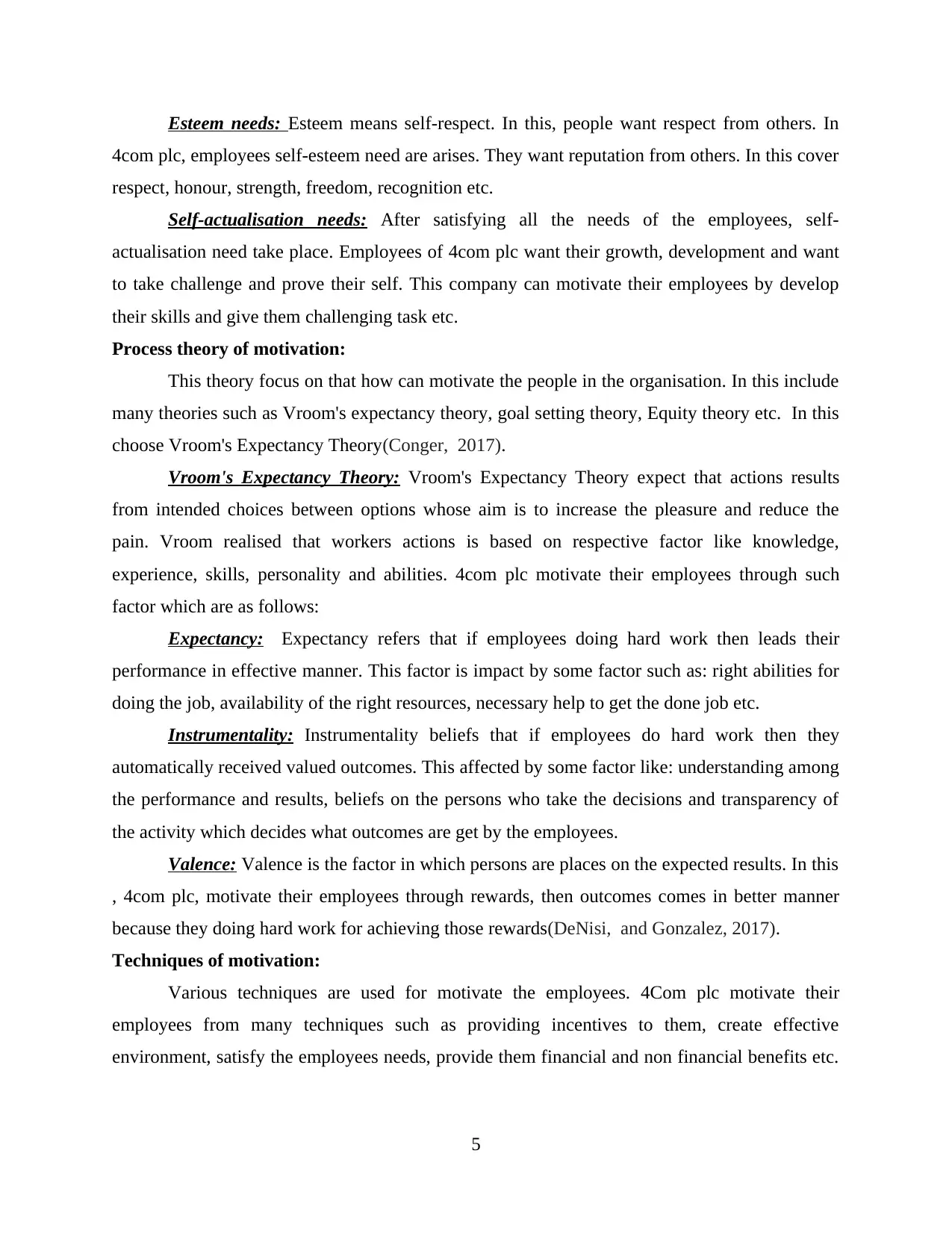
Esteem needs: Esteem means self-respect. In this, people want respect from others. In
4com plc, employees self-esteem need are arises. They want reputation from others. In this cover
respect, honour, strength, freedom, recognition etc.
Self-actualisation needs: After satisfying all the needs of the employees, self-
actualisation need take place. Employees of 4com plc want their growth, development and want
to take challenge and prove their self. This company can motivate their employees by develop
their skills and give them challenging task etc.
Process theory of motivation:
This theory focus on that how can motivate the people in the organisation. In this include
many theories such as Vroom's expectancy theory, goal setting theory, Equity theory etc. In this
choose Vroom's Expectancy Theory(Conger, 2017).
Vroom's Expectancy Theory: Vroom's Expectancy Theory expect that actions results
from intended choices between options whose aim is to increase the pleasure and reduce the
pain. Vroom realised that workers actions is based on respective factor like knowledge,
experience, skills, personality and abilities. 4com plc motivate their employees through such
factor which are as follows:
Expectancy: Expectancy refers that if employees doing hard work then leads their
performance in effective manner. This factor is impact by some factor such as: right abilities for
doing the job, availability of the right resources, necessary help to get the done job etc.
Instrumentality: Instrumentality beliefs that if employees do hard work then they
automatically received valued outcomes. This affected by some factor like: understanding among
the performance and results, beliefs on the persons who take the decisions and transparency of
the activity which decides what outcomes are get by the employees.
Valence: Valence is the factor in which persons are places on the expected results. In this
, 4com plc, motivate their employees through rewards, then outcomes comes in better manner
because they doing hard work for achieving those rewards(DeNisi, and Gonzalez, 2017).
Techniques of motivation:
Various techniques are used for motivate the employees. 4Com plc motivate their
employees from many techniques such as providing incentives to them, create effective
environment, satisfy the employees needs, provide them financial and non financial benefits etc.
5
4com plc, employees self-esteem need are arises. They want reputation from others. In this cover
respect, honour, strength, freedom, recognition etc.
Self-actualisation needs: After satisfying all the needs of the employees, self-
actualisation need take place. Employees of 4com plc want their growth, development and want
to take challenge and prove their self. This company can motivate their employees by develop
their skills and give them challenging task etc.
Process theory of motivation:
This theory focus on that how can motivate the people in the organisation. In this include
many theories such as Vroom's expectancy theory, goal setting theory, Equity theory etc. In this
choose Vroom's Expectancy Theory(Conger, 2017).
Vroom's Expectancy Theory: Vroom's Expectancy Theory expect that actions results
from intended choices between options whose aim is to increase the pleasure and reduce the
pain. Vroom realised that workers actions is based on respective factor like knowledge,
experience, skills, personality and abilities. 4com plc motivate their employees through such
factor which are as follows:
Expectancy: Expectancy refers that if employees doing hard work then leads their
performance in effective manner. This factor is impact by some factor such as: right abilities for
doing the job, availability of the right resources, necessary help to get the done job etc.
Instrumentality: Instrumentality beliefs that if employees do hard work then they
automatically received valued outcomes. This affected by some factor like: understanding among
the performance and results, beliefs on the persons who take the decisions and transparency of
the activity which decides what outcomes are get by the employees.
Valence: Valence is the factor in which persons are places on the expected results. In this
, 4com plc, motivate their employees through rewards, then outcomes comes in better manner
because they doing hard work for achieving those rewards(DeNisi, and Gonzalez, 2017).
Techniques of motivation:
Various techniques are used for motivate the employees. 4Com plc motivate their
employees from many techniques such as providing incentives to them, create effective
environment, satisfy the employees needs, provide them financial and non financial benefits etc.
5
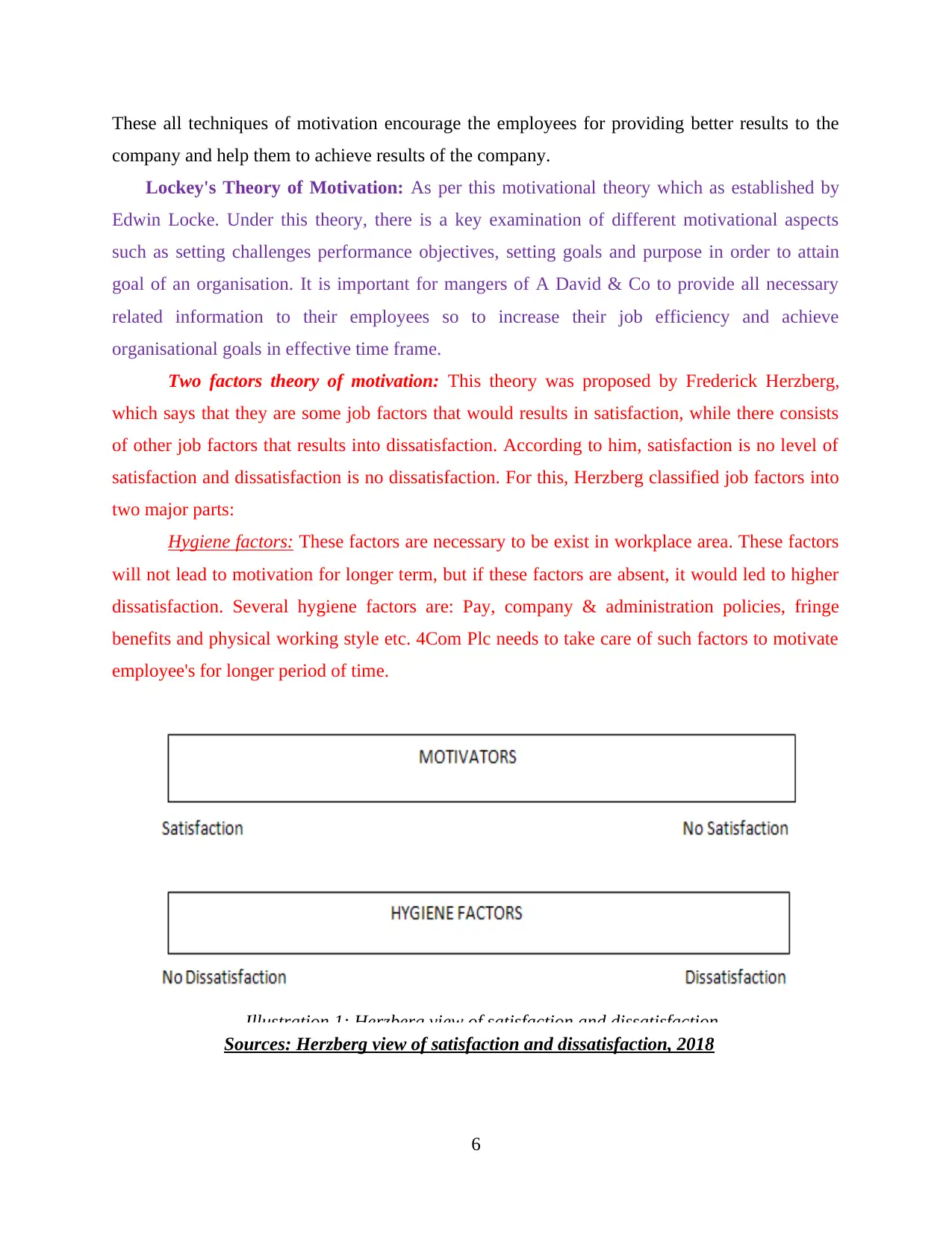
These all techniques of motivation encourage the employees for providing better results to the
company and help them to achieve results of the company.
Lockey's Theory of Motivation: As per this motivational theory which as established by
Edwin Locke. Under this theory, there is a key examination of different motivational aspects
such as setting challenges performance objectives, setting goals and purpose in order to attain
goal of an organisation. It is important for mangers of A David & Co to provide all necessary
related information to their employees so to increase their job efficiency and achieve
organisational goals in effective time frame.
Two factors theory of motivation: This theory was proposed by Frederick Herzberg,
which says that they are some job factors that would results in satisfaction, while there consists
of other job factors that results into dissatisfaction. According to him, satisfaction is no level of
satisfaction and dissatisfaction is no dissatisfaction. For this, Herzberg classified job factors into
two major parts:
Hygiene factors: These factors are necessary to be exist in workplace area. These factors
will not lead to motivation for longer term, but if these factors are absent, it would led to higher
dissatisfaction. Several hygiene factors are: Pay, company & administration policies, fringe
benefits and physical working style etc. 4Com Plc needs to take care of such factors to motivate
employee's for longer period of time.
Sources: Herzberg view of satisfaction and dissatisfaction, 2018
6
Illustration 1: Herzberg view of satisfaction and dissatisfaction
company and help them to achieve results of the company.
Lockey's Theory of Motivation: As per this motivational theory which as established by
Edwin Locke. Under this theory, there is a key examination of different motivational aspects
such as setting challenges performance objectives, setting goals and purpose in order to attain
goal of an organisation. It is important for mangers of A David & Co to provide all necessary
related information to their employees so to increase their job efficiency and achieve
organisational goals in effective time frame.
Two factors theory of motivation: This theory was proposed by Frederick Herzberg,
which says that they are some job factors that would results in satisfaction, while there consists
of other job factors that results into dissatisfaction. According to him, satisfaction is no level of
satisfaction and dissatisfaction is no dissatisfaction. For this, Herzberg classified job factors into
two major parts:
Hygiene factors: These factors are necessary to be exist in workplace area. These factors
will not lead to motivation for longer term, but if these factors are absent, it would led to higher
dissatisfaction. Several hygiene factors are: Pay, company & administration policies, fringe
benefits and physical working style etc. 4Com Plc needs to take care of such factors to motivate
employee's for longer period of time.
Sources: Herzberg view of satisfaction and dissatisfaction, 2018
6
Illustration 1: Herzberg view of satisfaction and dissatisfaction
⊘ This is a preview!⊘
Do you want full access?
Subscribe today to unlock all pages.

Trusted by 1+ million students worldwide
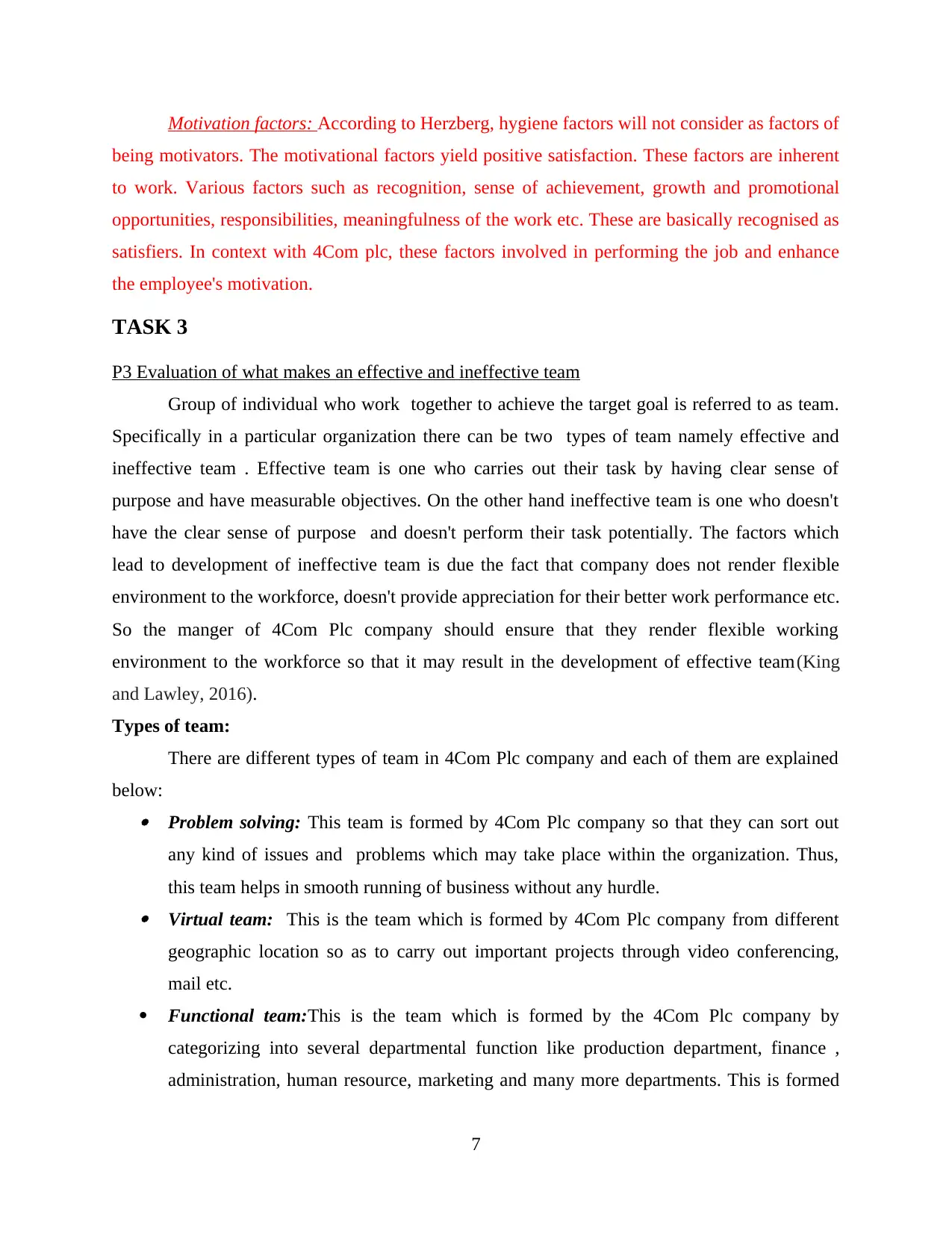
Motivation factors: According to Herzberg, hygiene factors will not consider as factors of
being motivators. The motivational factors yield positive satisfaction. These factors are inherent
to work. Various factors such as recognition, sense of achievement, growth and promotional
opportunities, responsibilities, meaningfulness of the work etc. These are basically recognised as
satisfiers. In context with 4Com plc, these factors involved in performing the job and enhance
the employee's motivation.
TASK 3
P3 Evaluation of what makes an effective and ineffective team
Group of individual who work together to achieve the target goal is referred to as team.
Specifically in a particular organization there can be two types of team namely effective and
ineffective team . Effective team is one who carries out their task by having clear sense of
purpose and have measurable objectives. On the other hand ineffective team is one who doesn't
have the clear sense of purpose and doesn't perform their task potentially. The factors which
lead to development of ineffective team is due the fact that company does not render flexible
environment to the workforce, doesn't provide appreciation for their better work performance etc.
So the manger of 4Com Plc company should ensure that they render flexible working
environment to the workforce so that it may result in the development of effective team(King
and Lawley, 2016).
Types of team:
There are different types of team in 4Com Plc company and each of them are explained
below: Problem solving: This team is formed by 4Com Plc company so that they can sort out
any kind of issues and problems which may take place within the organization. Thus,
this team helps in smooth running of business without any hurdle. Virtual team: This is the team which is formed by 4Com Plc company from different
geographic location so as to carry out important projects through video conferencing,
mail etc.
Functional team:This is the team which is formed by the 4Com Plc company by
categorizing into several departmental function like production department, finance ,
administration, human resource, marketing and many more departments. This is formed
7
being motivators. The motivational factors yield positive satisfaction. These factors are inherent
to work. Various factors such as recognition, sense of achievement, growth and promotional
opportunities, responsibilities, meaningfulness of the work etc. These are basically recognised as
satisfiers. In context with 4Com plc, these factors involved in performing the job and enhance
the employee's motivation.
TASK 3
P3 Evaluation of what makes an effective and ineffective team
Group of individual who work together to achieve the target goal is referred to as team.
Specifically in a particular organization there can be two types of team namely effective and
ineffective team . Effective team is one who carries out their task by having clear sense of
purpose and have measurable objectives. On the other hand ineffective team is one who doesn't
have the clear sense of purpose and doesn't perform their task potentially. The factors which
lead to development of ineffective team is due the fact that company does not render flexible
environment to the workforce, doesn't provide appreciation for their better work performance etc.
So the manger of 4Com Plc company should ensure that they render flexible working
environment to the workforce so that it may result in the development of effective team(King
and Lawley, 2016).
Types of team:
There are different types of team in 4Com Plc company and each of them are explained
below: Problem solving: This team is formed by 4Com Plc company so that they can sort out
any kind of issues and problems which may take place within the organization. Thus,
this team helps in smooth running of business without any hurdle. Virtual team: This is the team which is formed by 4Com Plc company from different
geographic location so as to carry out important projects through video conferencing,
mail etc.
Functional team:This is the team which is formed by the 4Com Plc company by
categorizing into several departmental function like production department, finance ,
administration, human resource, marketing and many more departments. This is formed
7
Paraphrase This Document
Need a fresh take? Get an instant paraphrase of this document with our AI Paraphraser
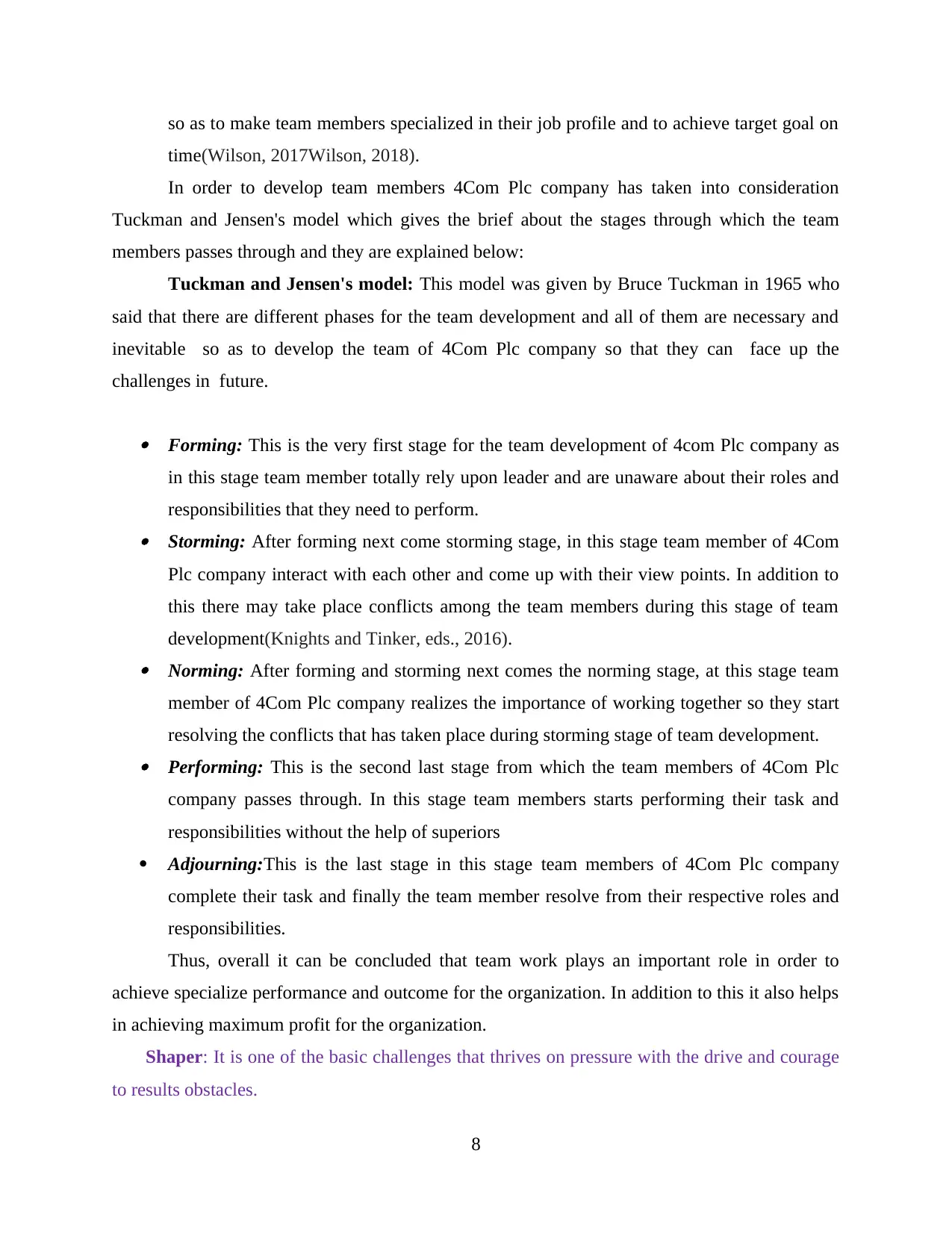
so as to make team members specialized in their job profile and to achieve target goal on
time(Wilson, 2017Wilson, 2018).
In order to develop team members 4Com Plc company has taken into consideration
Tuckman and Jensen's model which gives the brief about the stages through which the team
members passes through and they are explained below:
Tuckman and Jensen's model: This model was given by Bruce Tuckman in 1965 who
said that there are different phases for the team development and all of them are necessary and
inevitable so as to develop the team of 4Com Plc company so that they can face up the
challenges in future.
Forming: This is the very first stage for the team development of 4com Plc company as
in this stage team member totally rely upon leader and are unaware about their roles and
responsibilities that they need to perform. Storming: After forming next come storming stage, in this stage team member of 4Com
Plc company interact with each other and come up with their view points. In addition to
this there may take place conflicts among the team members during this stage of team
development(Knights and Tinker, eds., 2016). Norming: After forming and storming next comes the norming stage, at this stage team
member of 4Com Plc company realizes the importance of working together so they start
resolving the conflicts that has taken place during storming stage of team development. Performing: This is the second last stage from which the team members of 4Com Plc
company passes through. In this stage team members starts performing their task and
responsibilities without the help of superiors
Adjourning:This is the last stage in this stage team members of 4Com Plc company
complete their task and finally the team member resolve from their respective roles and
responsibilities.
Thus, overall it can be concluded that team work plays an important role in order to
achieve specialize performance and outcome for the organization. In addition to this it also helps
in achieving maximum profit for the organization.
Shaper: It is one of the basic challenges that thrives on pressure with the drive and courage
to results obstacles.
8
time(Wilson, 2017Wilson, 2018).
In order to develop team members 4Com Plc company has taken into consideration
Tuckman and Jensen's model which gives the brief about the stages through which the team
members passes through and they are explained below:
Tuckman and Jensen's model: This model was given by Bruce Tuckman in 1965 who
said that there are different phases for the team development and all of them are necessary and
inevitable so as to develop the team of 4Com Plc company so that they can face up the
challenges in future.
Forming: This is the very first stage for the team development of 4com Plc company as
in this stage team member totally rely upon leader and are unaware about their roles and
responsibilities that they need to perform. Storming: After forming next come storming stage, in this stage team member of 4Com
Plc company interact with each other and come up with their view points. In addition to
this there may take place conflicts among the team members during this stage of team
development(Knights and Tinker, eds., 2016). Norming: After forming and storming next comes the norming stage, at this stage team
member of 4Com Plc company realizes the importance of working together so they start
resolving the conflicts that has taken place during storming stage of team development. Performing: This is the second last stage from which the team members of 4Com Plc
company passes through. In this stage team members starts performing their task and
responsibilities without the help of superiors
Adjourning:This is the last stage in this stage team members of 4Com Plc company
complete their task and finally the team member resolve from their respective roles and
responsibilities.
Thus, overall it can be concluded that team work plays an important role in order to
achieve specialize performance and outcome for the organization. In addition to this it also helps
in achieving maximum profit for the organization.
Shaper: It is one of the basic challenges that thrives on pressure with the drive and courage
to results obstacles.
8
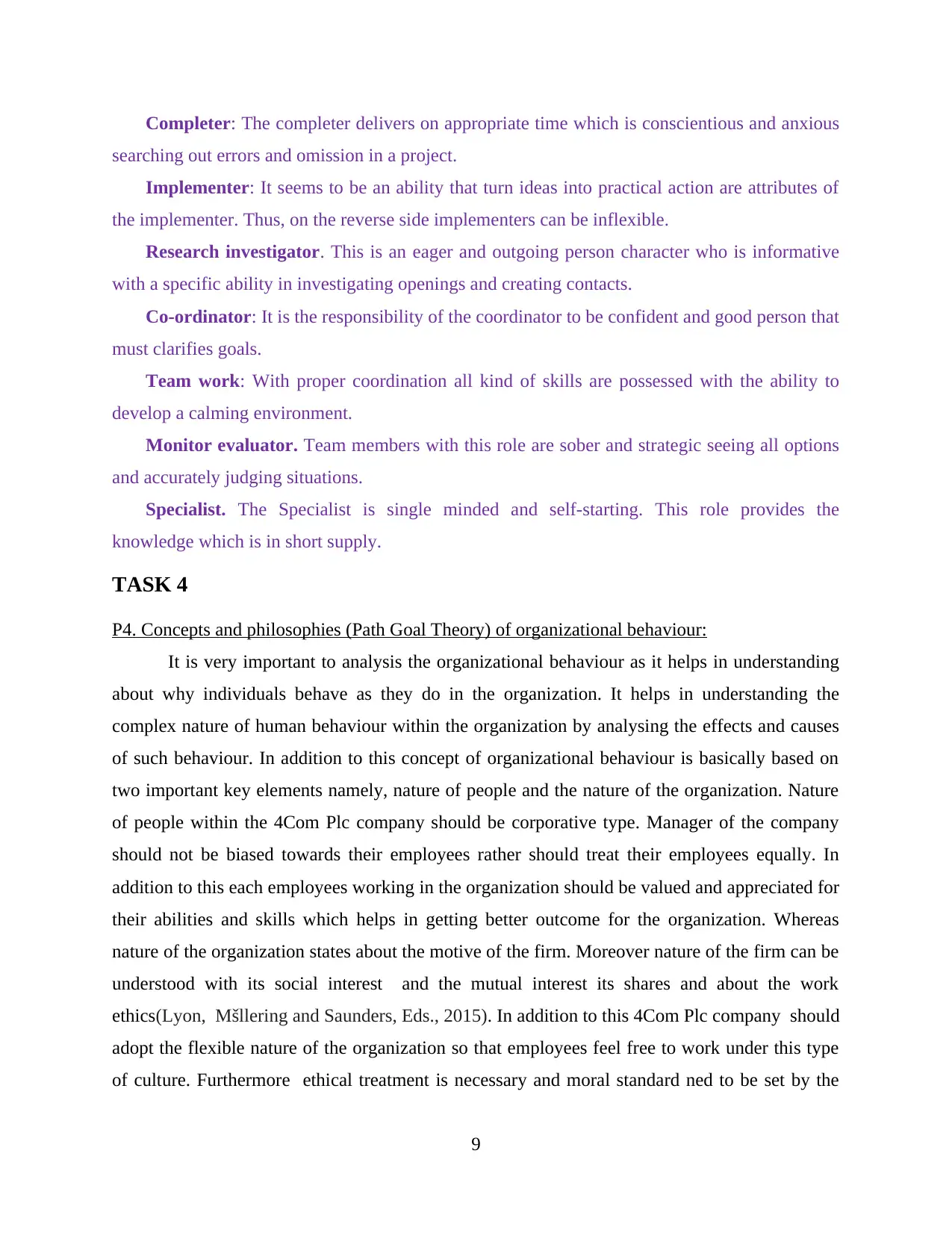
Completer: The completer delivers on appropriate time which is conscientious and anxious
searching out errors and omission in a project.
Implementer: It seems to be an ability that turn ideas into practical action are attributes of
the implementer. Thus, on the reverse side implementers can be inflexible.
Research investigator. This is an eager and outgoing person character who is informative
with a specific ability in investigating openings and creating contacts.
Co-ordinator: It is the responsibility of the coordinator to be confident and good person that
must clarifies goals.
Team work: With proper coordination all kind of skills are possessed with the ability to
develop a calming environment.
Monitor evaluator. Team members with this role are sober and strategic seeing all options
and accurately judging situations.
Specialist. The Specialist is single minded and self-starting. This role provides the
knowledge which is in short supply.
TASK 4
P4. Concepts and philosophies (Path Goal Theory) of organizational behaviour:
It is very important to analysis the organizational behaviour as it helps in understanding
about why individuals behave as they do in the organization. It helps in understanding the
complex nature of human behaviour within the organization by analysing the effects and causes
of such behaviour. In addition to this concept of organizational behaviour is basically based on
two important key elements namely, nature of people and the nature of the organization. Nature
of people within the 4Com Plc company should be corporative type. Manager of the company
should not be biased towards their employees rather should treat their employees equally. In
addition to this each employees working in the organization should be valued and appreciated for
their abilities and skills which helps in getting better outcome for the organization. Whereas
nature of the organization states about the motive of the firm. Moreover nature of the firm can be
understood with its social interest and the mutual interest its shares and about the work
ethics(Lyon, Mšllering and Saunders, Eds., 2015). In addition to this 4Com Plc company should
adopt the flexible nature of the organization so that employees feel free to work under this type
of culture. Furthermore ethical treatment is necessary and moral standard ned to be set by the
9
searching out errors and omission in a project.
Implementer: It seems to be an ability that turn ideas into practical action are attributes of
the implementer. Thus, on the reverse side implementers can be inflexible.
Research investigator. This is an eager and outgoing person character who is informative
with a specific ability in investigating openings and creating contacts.
Co-ordinator: It is the responsibility of the coordinator to be confident and good person that
must clarifies goals.
Team work: With proper coordination all kind of skills are possessed with the ability to
develop a calming environment.
Monitor evaluator. Team members with this role are sober and strategic seeing all options
and accurately judging situations.
Specialist. The Specialist is single minded and self-starting. This role provides the
knowledge which is in short supply.
TASK 4
P4. Concepts and philosophies (Path Goal Theory) of organizational behaviour:
It is very important to analysis the organizational behaviour as it helps in understanding
about why individuals behave as they do in the organization. It helps in understanding the
complex nature of human behaviour within the organization by analysing the effects and causes
of such behaviour. In addition to this concept of organizational behaviour is basically based on
two important key elements namely, nature of people and the nature of the organization. Nature
of people within the 4Com Plc company should be corporative type. Manager of the company
should not be biased towards their employees rather should treat their employees equally. In
addition to this each employees working in the organization should be valued and appreciated for
their abilities and skills which helps in getting better outcome for the organization. Whereas
nature of the organization states about the motive of the firm. Moreover nature of the firm can be
understood with its social interest and the mutual interest its shares and about the work
ethics(Lyon, Mšllering and Saunders, Eds., 2015). In addition to this 4Com Plc company should
adopt the flexible nature of the organization so that employees feel free to work under this type
of culture. Furthermore ethical treatment is necessary and moral standard ned to be set by the
9
⊘ This is a preview!⊘
Do you want full access?
Subscribe today to unlock all pages.

Trusted by 1+ million students worldwide
1 out of 15
Related Documents
Your All-in-One AI-Powered Toolkit for Academic Success.
+13062052269
info@desklib.com
Available 24*7 on WhatsApp / Email
![[object Object]](/_next/static/media/star-bottom.7253800d.svg)
Unlock your academic potential
Copyright © 2020–2025 A2Z Services. All Rights Reserved. Developed and managed by ZUCOL.





